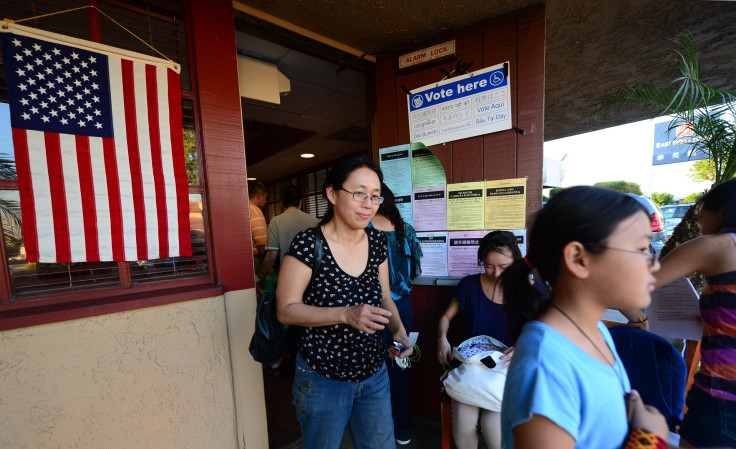Donald Trump’s ‘Exclusionary Rhetoric’ Unpopular With Asian-Americans As Group Becomes More Democratic

Presumptive Republican nominee Donald Trump has changed many things about the 2016 election cycle, and now he may be changing the way Asian-Americans think about voting and party identification. A new survey from several Asian-American advocacy groups found that voters in that demographic are increasingly identifying with the Democratic Party and that, regardless of their party affiliation, they do not like Trump.
The poll, which asked 1,200 Asian-American registered voters about their political identification and voting habits, found the percentage who identify as Democrats has increased from 35 percent in 2012 to 47 percent this year.
Previous research has shown Asian-Americans tend to have weak party affiliation, at least partly because they are the racial group with the highest proportion of immigrants. Thus many Asian-Americans have less experience with the two U.S. parties. The new report said both Democrats and Republicans have ramped up their outreach to Asian-Americans over the past four years, but only Democrats have seen an increase among these voters.
In 2016, 37 percent of Asian-Americans still identify as independents or are unsure which party they identify with, and 15 percent identified as Republicans. The biggest shift came from the nonidentifying category toward Democrats, while Republicans dropped just 3 percentage points from 2012, within the plus or minus 3 percent margin of error.
As for Trump, 61 percent of Asian-Americans hold an unfavorable view of him, while just 26 percent have an unfavorable view of Democratic front-runner Hillary Clinton. When Asian-American voters were asked what they would do if a candidate held strongly anti-immigrant views, 40 percent said they would vote for someone else. This was particularly true of young Asian-Americans 18 to 34 — a majority (51 percent) of that bloc said they would vote for someone else.
If a candidate expressed strong anti-Muslim views, 43 percent of Asian-American voters said they would vote for someone else, and 73 percent of those in the 18-34 group said they would vote for another candidate.
The report, titled "Inclusion, Not Exclusion," was done by groups such as Asian Americans Advancing Justice and Asian and Pacific Islander American Vote. “The survey shows that Asian Americans are paying close attention to political discourse and will not vote for a candidate expressing exclusionary rhetoric that serves only to separate communities. Anti-immigrant and anti-Muslim language will not win over Asian-American voters,” Mee Moua, president and executive director of Asian Americans Advancing Justice, said in a statement.
Asian-Americans are not often treated as a crucial voting bloc in the way Hispanics and African-Americans are, and they are less likely to be contacted by political parties than other groups. But the number of Asian-Americans nearly doubled from 2 million voters in 2000 to 3.9 million in 2012, according to the Center for American Progress. The Asian-American community already makes up more than 5 percent of the voting-age population in seven states and is projected to reach 5 percent of voters nationally by 2025 and 10 percent by 2044.
The report also found that Asian-Americans in California, which is one of the last states to hold its presidential primary, favor Clinton over her Democratic rival, Vermont Sen. Bernie Sanders. A full 33 percent of Asian-Americans in the Golden State said Clinton was their first choice, while 21 percent liked Sanders and 12 percent favored Trump.
Younger Asian-Americans preferred Sanders, a trend that follows the pattern the senator has seen in other states. Asian-Americans born in the U.S. also preferred Sanders to Clinton, while those who were born in other countries preferred Clinton.
© Copyright IBTimes 2024. All rights reserved.






















